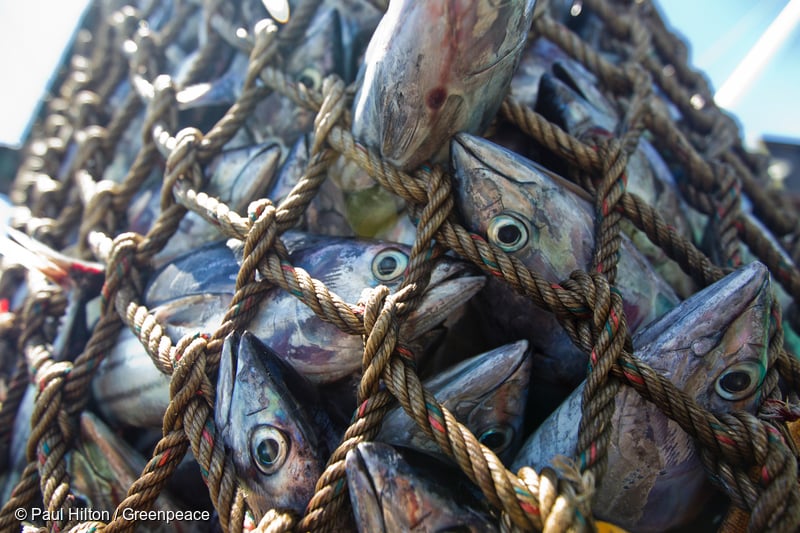The commercial fishing industry is wreaking havoc on the world’s oceans, and a big part of the story involves a massive problem that’s eluded mainstream attention: illegal, unreported and unregulated (IUU) fishing.
IUU fishing includes everything from illegal shark-finning to fishing in protected areas and without permission in other nation’s waters. Each year 56 billion tons of marine wildlife are harvested illegally, and in 2019, an estimated $2.4 billion worth of IUU seafood was imported into the US.
IUU fishing is a scourge devastating the world’s oceans, but focusing on the environmental impact alone only reveals part of the picture. IUU fishing is a risky business, and in many cases, the only way to run an IUU fishing operation is through forced labor and human trafficking—basically modern slavery.
It’s simple: we have to stop IUU fishing to protect our oceans, and to do that, we have to tackle environmental and human rights concerns at the same time. This has been Greenpeace’s position for years. Finally, the message is breaking through. Today, the Illegal Fishing and Forced Labor Prevention Act was introduced in Congress.
This bill could help address IUU fishing and forced labor at sea by increasing industry transparency, and expanding the government’s ability to prevent illegally caught seafood from entering the US. Shockingly, the definition of “illegal fishing” in US law does not explicitly include labor rights violations. The Illegal Fishing and Forced Labor Prevention Act would change that, allowing for stronger tools and stricter oversight to stop forced labor at sea.

Tuna fishing
In previous reports, Greenpeace Southeast Asia and Greenpeace East Asia uncovered allegations of widespread and systemic human rights abuses on the high seas, oftentimes occurring alongside illegal shark finning and illegal transshipment at sea. Migrant fishers are kept at sea for months and sometimes even years at a time under conditions of debt bondage, often while being deprived of adequate food, water, and medical treatment, and even enduring physical and other forms of abuse and violence.
For decades, the commercial fishing industry and retailers kept silent while profiting from modern slavery at sea. Even now, with such horrific abuses widely known, the fishing industry and global buyers largely continue to make excuses for not taking the necessary actions to stop the problem. Lack of transparency in the industry has made it difficult to know for certain whether seafood purchased by consumers is caught with forced labor or not. Of course, this isn’t to say no one could have tried to uncover the truth. A major reason why modern slavery in the commercial fishing industry has gone on for so long is because governments around the world have looked the other way—including our own.
By empowering the US government to apply greater scrutiny to global seafood supply chains, and to penalize countries that fail to take sufficient action on forced labor in their fisheries, the Illegal Fishing and Forced Labor Prevention Act will put pressure on companies and other nations to change their policies, laws and practices to prevent and hopefully end forced labor at sea. After all, the US is the world’s biggest seafood importing nation. Anyone who wants to access this country’s enormous market will have to play by the rules our government sets.
The Illegal Fishing and Forced Labor Prevention Act is an important step in a long journey, but it won’t be enough on its own to end IUU fishing and forced labor at sea. We’ll need everyone working together for the long haul to protect the world’s oceans and the people who work on them. But first, we’ve got to pass this bill.
You can help by sending a message to your representatives urging them to co-sponsor the Illegal Fishing and Forced Labor Prevention Act.

